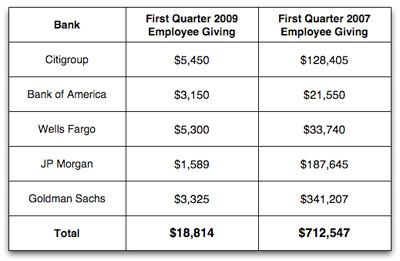Bankers Turn Off Campaign Cash Spigot
An analysis of Federal Election Committee filings by The Washington Independent shows a steep drop-off in financial industry giving.
Jul 31, 20201.1M Shares16.7M Views
Since the financial industry bailouts began, Wall Street and Washington have never looked closer. But as the recession deepens and banks grow to resent the stigma associated with taxpayer aid, an unexpected chill is occurring: Bank employees are slamming their checkbooks shut.
Individual executives and workers at the 10 biggest beneficiaries of the TARP bailout donated slightly more than $31,000 to congressional campaigns and party committees during the first quarter of this year, according to a Washington Independent analysis of campaign finance reports filed with the Federal Election Commission.
Image by: Matt Mahurin
Moreover, the total donations from employees at the top five banks receiving TARP capital – Detroit automakers were excluded – is less than three percent of what they were during a similar period in the 2008 election cycle.
The bleak economy is undoubtedly a factor in the drop, but it appears that lawmakers as well as bankers are in agreement with the CEO of JP Morgan Chase, who quipped recentlythat the bailout was a “scarlet letter” he could not wait to shed.
Citigroup employees, for example, were the TARP’s second-largest congressional donors so far this year, contributing $5,450. But that number represents just 5 percent of the employee giving that occurred in the first quarter of the election cycle that just ended, when Citigroup employees gave $128,405 to lawmakers’ campaigns and party committees.
“Members of Congress really don’t want to get in the press taking money from Bank of America right after they doled out money to Bank of America,” said Craig Holman, legislative representative for Public Citizen’s Congress Watch. “And that’s perfectly understandable.”
Indeed, several senior Democrats – including Senate Banking Committee Chairman Chris Dodd (D-Conn.)and Finance Committee Chairman Max Baucus (D-Mont.) – already have forsworn campaign contributions from the political action committees, known as PACs, of banks receiving TARP assistance.
But apart from House Financial Services Committee Chairman Barney Frank(D-Mass.), lawmakers have avoided any ban on donations from individual bank executives. And with good reason; even campaign finance watchdogs see no problem with the employees of TARP participants exercising their constitutional right to give to congressional campaigns.
Still, the bottom has fallen out of the boom in election-season largess from bank workers. The largest amount of donations coming from a single TARP beneficiary during the first three months of this year was the $6,100 given by employees at Morgan Stanley (see chart).
That number is decidedly off-pace from the contribution rate at Morgan during the 2008 election, when employees gave $910,400 to congressional candidates and party committees alone – excluding donations to presidential campaigns and the company PAC.
The donation data analyzed by The Washington Independent excludes money given to 2008 presidential campaigns, state- and county-level political committees, and company PACs – although PAC donations from bailed-out banks also are down by about one-third for the first quarter of 2009, according to Holman. Winnowing out those three types of donations allows for a specific look at how bailed-out bank employees view members of Congress this year.
“You could see that there would be a logic[al reason], with the government playing such a large role in their sector, for them to be giving a fair amount of money,” observed Meredith McGehee, policy director at the Campaign Legal Center.
So why are bank workers shrugging at the Capitol Hill money chase? Perhaps, McGehee replied, for the same reason that most ordinary Americans wouldn’t give to their favorite member of Congress: they’re strapped for cash.
“These are people that made lots and lots of money” in the past, she said. “[Now] those who have not lost their jobs fear they will, and in this case the desire to spend their own money on political contributions is not so great.”
Rising economic insecurity on Wall Street, where lost financial-industry jobs are already estimatedat more than 20,000, is one possible reason for the slide in donations. Another is the “scarlet letter” factor, as JP Morgan CEO Jamie Dimon put it to reporters earlier this month (not long after he jokingly presented Treasury Secretary Tim Geithner with a fake check repayinghis bank’s bailout money).
As the personal lives of bailed-out executives attract more scrutiny from the media and more frustration from the public, even mid-level bank workers may be fearful of undue attention paid to their political giving patterns. After furious lawmakers castigated AIG CEO Edward Liddy over the company’s $450 million bonus payouts, AIG employees began receiving threats of strangulation with piano wire and violence against their children.
“A lot of it has to do with keeping a low profile, not becoming a target of AIG-type speculation,” reasoned Bill Allison, senior fellow at the non-profit Sunlight Foundation. “If you give now, you may be putting a big neon light over your head.”
In fact, AIG offers a stark picture of the plunge in personal giving by bailed-out bank employees. No donations were reported from within the troubled firm’s ranks during the first quarter of 2009, compared with more than $226,000 in congressional contributions from AIG workers during the 2008 election season.
The same pattern is visible at Merrill Lynch and Wachovia, which were both bought by competitors last year in shotgun marriages orchestrated by the government. Despite the banks’ escape from imminent bankruptcy, donations from employees remain notably low.
Wachovia workers and executives sent $2,520 to Capitol Hill campaigns during the first quarter of this year, or less than 1 percent of the company’s $368,200 in individual donations ahead of last year’s election.
An even bigger drop occurred at Merrill, where workers and executives have given $3,250 to campaigns so far this year after pouring $93,600 into congressional coffers during the same period in the 2008 election cycle – when their total giving topped $976,200.
But the downturn in contributions from bank executives and workers should not be mistaken for a diminishment in Wall Street’s long-term influence. The current lull also may be driven by the financial industry’s acceptance of newly heightened regulations as a foregone conclusion, while other industries gear up to fend off still-uncertain government involvement.
“I’m not sure there’s quite the same [volume of] talk of rewriting the rules that there is in health care,” Allison, of the Sunlight Foundation, said. “The bank battle is more midstream.”
Even the most outspoken inter-office critic of the bailout — AIG vice-president Jake DeSantis, who wrotea New York Times op-ed defending his performance — is a lapsed campaign donor.
DeSantis gave $2,100 to Dodd at the very beginning of the 2008 election, after donating the same amount to ex-Rep. Nancy Johnson (R-CT) during the 2006 cycle. This year, FEC reports show that he gave nothing.
Elana Schor is a freelance political reporter in Washington, DC. She has previously written for Talking Points Memo, The Guardian and The Hill.

Paolo Reyna
Reviewer
Paolo Reyna is a writer and storyteller with a wide range of interests. He graduated from New York University with a Bachelor of Arts in Journalism and Media Studies.
Paolo enjoys writing about celebrity culture, gaming, visual arts, and events. He has a keen eye for trends in popular culture and an enthusiasm for exploring new ideas. Paolo's writing aims to inform and entertain while providing fresh perspectives on the topics that interest him most.
In his free time, he loves to travel, watch films, read books, and socialize with friends.
Latest Articles
Popular Articles

